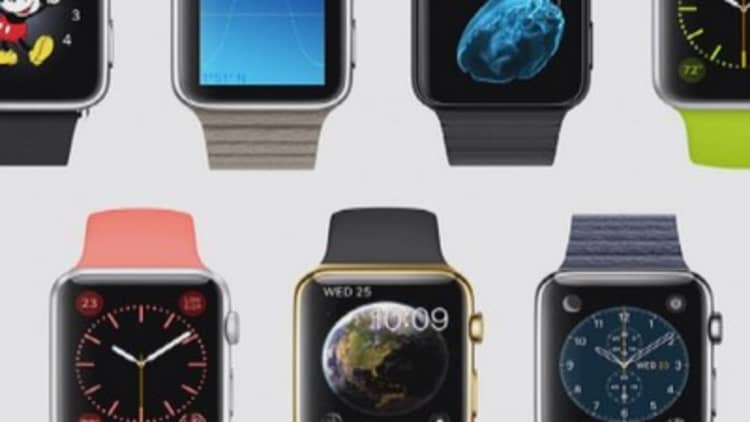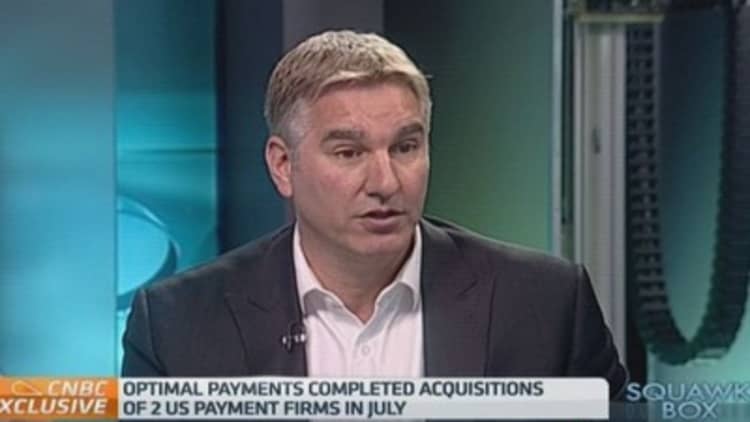The tech industry has been planning for years a world where shoppers use their phones for most shopping, and analysts believe Apple's new payment system could finally make mass adoption a reality.
Called Apple Pay and scheduled for an October launch, the company's mobile payments system will allow consumers to pay by touching their phone to a NFC sensor at a checkout, and authorize those transactions with a fingerprint-protected button.
"I think it's really a tipping point," NFC Forum Executive Director Paula Hunter said. "Now all the major firms offer NFC and NFC payments to consumers."

Near-field communication—a short-range wireless technology that lets mobile devices connect, exchange information and make transactions with just a touch—has existed since Sony, Nokia and Philips created the NFC Forum in 2004. However, until Tuesday's announcement, the iPhone never offered the technology.
An added challenge in convincing consumers and merchants to give up plastic cards was the fact that the technology was mostly confined to Android devices. PayPal and Softcard (formerly ISIS Wallet) have also struggled to gain traction in the last few years.
Apple's brand power changed things, say analysts. It allowed the tech company to forge partnerships with major financial institutions and retailers, giving it access to 83 percent of credit card purchases in the United States and 220,000 merchant locations when the program is fully launched.
"I think it's a significant boost for mobile payments and merchants using mobile payments," said Randy Vanderhoof, executive director of the Smart Card Alliance. "There hasn't been a single marketing force with the power and clout that Apple brings to the market."
Read MoreApple Pay in Asia? Don't put your money on it
In contrast, PayPal only had 16 relationships when it launched a mobile payments program in 2012, growing to just 18,000 U.S. stores in January of this year.
"You have to have a really strong value proposition" in order to get merchants on board, Pacific Crest analyst Josh Beck said. "Then they have to be more aggressive in marketing to consumers."

Apple's retail partners announced on Tuesday included Apple stores, Panera Bread, Sephora, Subway, Disney, McDonald's, Whole Foods, Staples, Walgreen, Macy's and its subsidiary Bloomingdale's. Target, OpenTable and Groupon customers will be able to use Apple Pay to make app purchases, and the service will also become an option for charging the Starbuck's card on the store's existing app.
Spokespeople for the stores highlighted the convenience Apple Pay would bring. Only Subway did not respond to a request for comment.
Read MoreDebt-averse millennials steer clear of credit cards
For other firms, mobile payment is a potential marketing bonanza. Victor Ho and Matt Doka co-founded a mobile loyalty and marketing automation service for small businesses called FiveStars three years ago in California.
FiveStars uses information captured by participating merchants and consumers to generate tailored marketing campaigns, such as rewards adapted to a specific consumer's purchase habits. Ho said the service operates in 5,000 U.S. small businesses, and could easily pair its data collection and rewards system with Apple Pay transactions.
This is the "best possible technology for us," Ho said.
Rewards and deals are also behind the strategy of Softcard, an NFC-based mobile payments app founded by cellphone carriers last year. The service gained some traction among consumers with its free Jamba Juice offers and discounts on retailers such as Toys R Us. But the lack of NFC on the iPhone and issues with its former name "ISIS Wallet" had kept Softcard on the sidelines.
Softcard CEO Michael Abbott said the company is "actively working with Apple to enable Softcard on the iPhone in 2015."
Some obstacles to mass adoption still remain, though.
A September survey from CreditCards.com found that 44 percent of respondents would never use their phone to make a payment. But Matt Schulz, the firm's senior analyst, said that younger people surveyed were less resistant to mobile payments than those 65 and older.
"Since Apple is kind of the leader in this and has put so much in it, it's important for them to show people that it's secure and as easy to use as a credit or debit card," he said. "I think that over time there's a good chance that people will use it."
Read MoreTrust a bluetooth lock for your bike?
For a service dependent on consumers embracing a new device, Apple Pay may face challenges in adoption without benefiting the company itself. But NFC-like technologies such as Bluetooth low energy and Apple's work with iBeacon could capitalize on the rise of mobile payments.
As Hunter noted, "It's a really good day for NFC."
How well all this helps Apple's bottom line is another question., Pacific Crest analyst Andy Hargreaves cited concerns that Apple Pay would not generate profit and downgraded the company to "sector perform" from "outperform" on Wednesday. But Bloomberg reported that Apple will likely generate revenue from fees charged to banks every time consumers use their iPhone to pay.
—By CNBC's Evelyn Cheng
Correction--This story has been updated to accurately reflect the number of U.S. businesses that use FiveStars.


